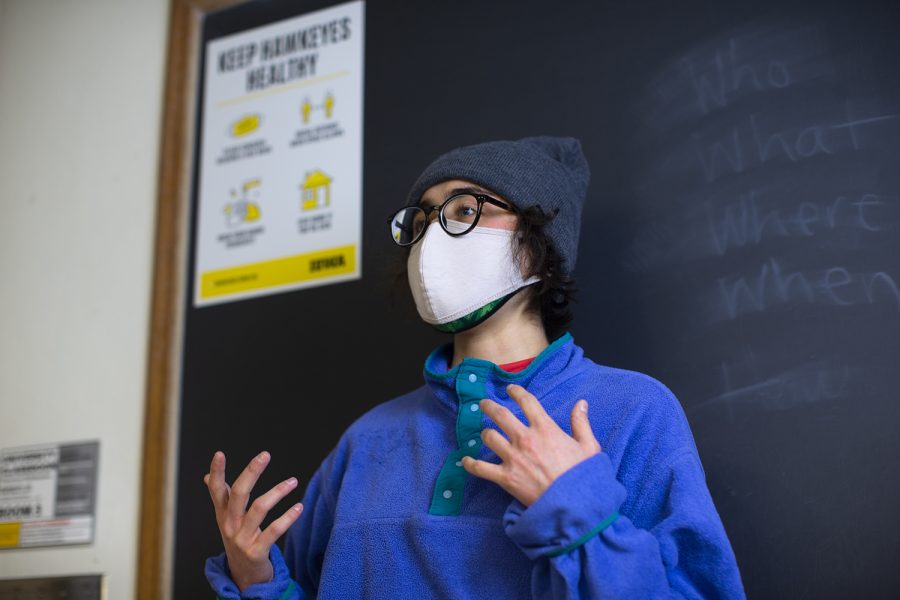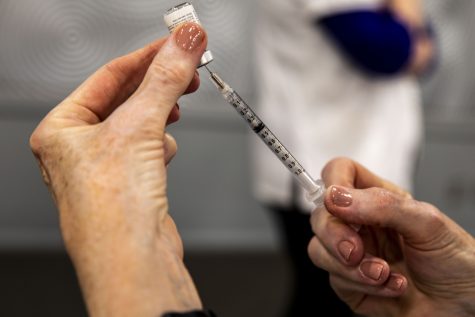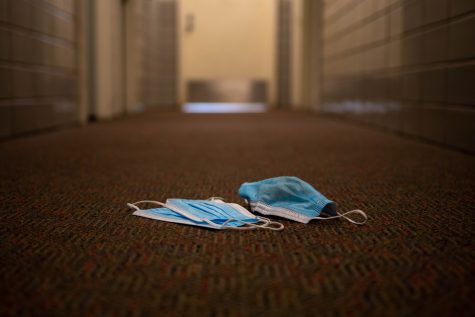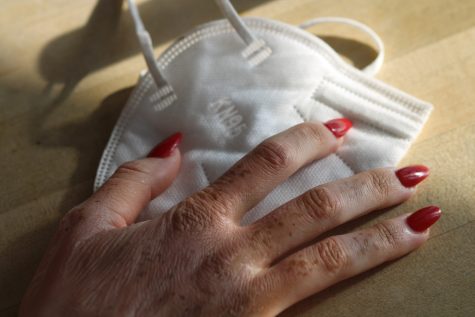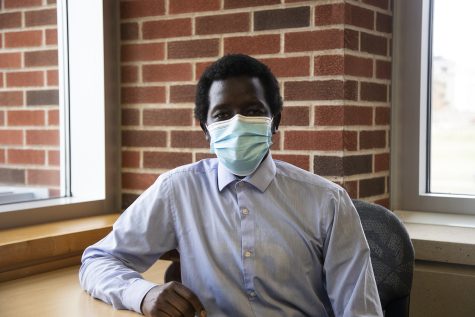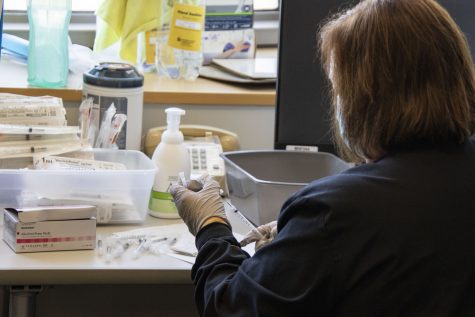University of Iowa COVID-19 protocols leave students, professors, struggling for solutions
Almost two years into the COVID-19 pandemic, University of Iowa students, faculty, and graduate teaching assistants are struggling to find consistency when someone in their classrooms test positive for the virus.
University of Iowa grad student and teaching assistant Hannah Zadeh poses for a portrait in a classroom at Schaeffer Hall on Monday, Dec. 6, 2021. (Gabby Drees/The Daily Iowan)
When Thom Blair had COVID-19 in September, attending class and doing homework was the last thing on his mind.
After days of experiencing flu-like symptoms, Blair, who has Type 2 diabetes, tested positive for COVID-19. The University of Iowa second-year student’s underlying health issues increased his likelihood of suffering serious symptoms, and he was worried for his life, especially since he lived in the dorms and relied on others to bring him food during his quarantine.
Blair said he experienced a breakthrough case after being vaccinated for several months.
“When you’re worried about dying, you don’t care as much about classes and notes,” he said. “This is a life-or-death situation for a lot of people.”
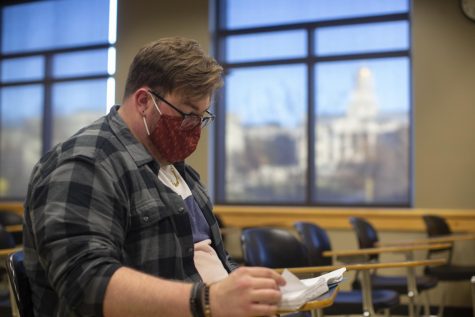
While Blair was quarantined in Currier Residence Hall earlier this semester, he said he emailed all of his professors after self-reporting his positive test to the university. He was not in the headspace to participate in online lectures or engage with his classes due to brain fog, a symptom of COVID-19, and increased stress, he said.
Still, he asked for notes from his professors, but didn’t receive all the materials he needed.
“I never got notes in one of my classes, just because I didn’t know anybody, and in others, I got notes from friends,” he said. “In my Designing Political Research class, I was stranded. I had no idea what we covered that week. I still don’t.”
Nearly two years into the COVID-19 pandemic, Blair said there was no organized way for him to request notes from his professors or Teaching Assistants — something he said he believes should be guaranteed by the university.
“I’m not getting the week back that I missed,” he said. “I figured, because we had a whole year and half of this to figure it out, the professors would have a very specific set of notes for the students that are going to get COVID, or have the lectures from last year recorded and send them to the students who are sick. It’s not hard to do that, but they didn’t.”
Blair particularly struggled with classes where he didn’t know other students because he missed conversations during in-person lectures that didn’t make it into notes, like conversations about papers and other assignments.
RELATED: UI to maintain current COVID-19 guidance despite faculty petition
Jenna Yang, UI Undergraduate Student Government director of academic affairs, said strict UI protocols don’t exist to accommodate students who test positive for coronavirus.
She said professors have been instructed by the university to be lenient with students to ensure they get whatever materials they need.
“Obviously, life happens,” she said. “If people get sick, professors have been instructed to show leniency and to work with the student in whatever way they can on a case-by-case basis.”
While Yang said she hasn’t heard of any students not receiving the accommodations they need this year, she said she wouldn’t be surprised if there was some miscommunication.
“In my experience, professors have been kind about this,” she said. “As awful as it is, it wouldn’t surprise me if professors hadn’t always been so kind or friendly… I’m happy to say I haven’t heard anything from people I know having problems with professors and testing positive.”
The process has become more collaborative than in the 2020-21 academic year when it comes to students testing positive, she said. Now, she added, students have more space to work with professors to get what they need rather than being told what to expect.
Graduate teaching assistants serve as the in between
The burden of students being sick can fall onto teaching assistants, said Hannah Zadeh, a sociology Teaching Assistant and Campaign to Organize Graduate Students member.
The first-year graduate student said there are no protocols for TA’s when their students test positive.
“As a TA, I don’t get reports from the university if my students report that they’re positive for COVID,” they said. “I have had quite a few students email me and tell me that they have COVID, and I don’t know if any of them reported it to the university, but I’d assume some of them, and I’ve never gotten a university email saying so.”
During the 2020-21 academic year, instructors were informed when students tested positive. Zadeh said the entire experience is extremely stressful for them and their peers, as well as students. It also creates a “potentially adversarial relationship” between graduate and undergraduate students, they said.
“I get students who reach out to me and I can tell they are really terrified of what they expect me to say when they miss two classes in a row because they have COVID,” Zadeh said. “I have to write them back and be like, ‘No, it’s okay, I appreciate you not coming into class.’”
These concerns have been brought up by the Campaign to Organize Graduate Students, the union that represents graduate students. In an email from Amanda Thein, the associate provost for Graduate and Professional Education, to COGS President Hadley Galbraith, Thein said the request to notify instructors when their students test positive raises significant privacy concerns.
Data visualization by Eleanor Hildebrandt/The Daily Iowan
To date, 440 students, 58 faculty members, and 282 staff members at the UI have tested positive for COVID-19 since the beginning of fall semester. The majority of the students who tested positive were undergraduates, while 19 graduate students who have taught this year tested positive as well, UI Assistant Vice President for External Relations Jeneane Beck wrote in an email to The Daily Iowan.
“Only two courses (out of thousands offered) have more than two cases,” Beck wrote. “The spread of the disease has been minimized in classrooms due to proactive steps the university has taken, such as: providing incentives to students to get vaccinated and strongly encouraging everyone to wear face coverings in the classroom, allowing instructors to use plexiglass at the front of the class, following CDC recommended cleaning procedures, and upgrading air filtration systems.
Beck wrote that faculty received guidance at the start of the fall semester regarding how to handle students testing positive. The university is following standard university absence from class policies. This information was also communicated to students, Beck wrote.
Zadeh added that there is a burden placed on everyone in the situation, which harms their mental health, too.
Blair said he relied on some of his TAs for additional instruction during their office hours after receiving notes from some classes. Brain fog, specifically, made it difficult for Blair to focus during the office hours until his symptoms cleared up.
“I wasn’t in the headspace to do much, but I went to one office hours because I wanted to let my TA know I wouldn’t be in his section that day. But honestly, with COVID, it’s very, very difficult to do anything,” he said. “It became more of a challenge. [My TA] walked me through everything he could.”
UI Graduate Student Senate president Kody Waldstein said widespread communication issues are largely impacting how instructors move forward, whether they are graduate students or professors.
“It’s very apparent to me, over my time in student government, that there’s a lot of offices and there’s a lot of people whose entire job is to support graduate students,” he said. “And there’s a lot of awesome resources there, but unfortunately, sometimes it’s difficult for students to know but also just to remember. And depending on what your college department is, you might not see a lot of that information again until you need it.”
He said there are various resources available when people test positive — it’s just a matter of finding the ones needed in a timely manner.
“I think everyone is doing the best that they can, given the constraints that they have from medical guidelines from the FDA and CDC,” he said. “They’re trying to do the best they can while also following executive mandates at the state level. It’s an interesting time, because not all of those are together and you have to figure it out.”
The professors’ perspective
According to the UI College of Liberal Arts and Sciences, “an instructional modality change from in-person to online for more than one or two class periods is not permitted” for any instructor. As the DI previously reported, COGS has asked to increase the amount of online days as part of an OSHA complaint the union filed against the university.
The college’s guide suggests instructors “arrange for coverage of teaching and office hours obligations during a brief illness or when a short absence from the classroom needs to occur.”
This isn’t as easy as it may seem, said Loren Glass, UI English department chair and president of the UI American Association of University Professors.
One solution Glass has seen in the English department included a professor Zooming into a classroom where their students were, after someone — another professor, a student, or a staff member — set up the room.
“Other options when a faculty member calls in sick is I find someone who’s free during that time and in the building. But we don’t always have people in the same discipline, so we’re extremely limited,” he said. “It’s not always sustainable.”
Glass said the policy also raises equity questions, since some professors instruct classes daily while others teach only twice a week.
“It’s not equitable,” he said. “It doesn’t seem fair and it’s a concern for faculty. We are burdened differently based on what classes we’re teaching and the idiosyncrasies of our classes, which doesn’t make sense and impacts people differently.”
Some professors who test positive, however, cannot teach. When Raghuraman Mudumbai, a UI associate professor of electrical and computer engineering, tested positive for COVID-19 this fall, he said he couldn’t stand up, much less teach.
It was also the second time he had tested positive during the pandemic.
RELATED: UI students, staff work to accommodate absences as non-COVID-19 illnesses tick up on campus
Mudumbai said his infection took him out of the headspace and physical ability to teach, even if he wanted to do so virtually.
“In addition to self reporting, I sent an email to my department chair to notify them,” he said. “… I just went ahead and canceled the first lecture the following week, and no one said anything. No one objected or spoke to me about it. I didn’t know at the time how I was going to make up that class, either.”
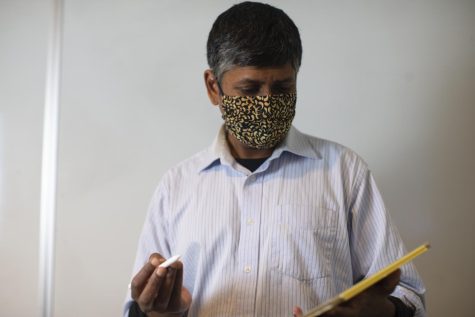
Instead, a different faculty member from the UI College of Engineering took on Mudumbai’s class responsibilities for two weeks.
“I ended up contacting a colleague and working with them over Zoom as best I could to get him ready to substitute for me until I was well enough to do Zoom lectures,” he said. “I had to help him understand my slides, and then I had to transition mine to Zoom. It was a lot.”
When Mudumbai returned to in-person work in early November, he said he heard similar stories from colleagues with confusion of how to move forward with teaching responsibilities after receiving a COVID-19 diagnosis.
Now, as finals week approaches, Mudumbai said he is still behind. He had to ask for a lot of help from his department while he got better, he said, and it still wasn’t sufficient. When he felt better and could return to his normal workday, he wasn’t sure what to tackle first.
“Was it grading? I didn’t have that done. Was it reorganizing my lectures? The university didn’t give us additional TA support to catch up on backlogs. I was alone,” he said.
Classroom alterations
When professors cannot make the best decisions for their classes, Glass said it can decrease the quality of the classroom experience.
“Surely, the quality is being compromised,” he said. “People are not able to be as rigorous and careful as they want. I think the highest damage is the level of morale in faculty in particular. And most students are pretty unhappy they have to learn under these conditions, too.”
Mudumbai expressed frustration with the university’s policies and follow-through when he tested positive.
“The university is an academic institution that is supposed to provide intellectual leadership, and I don’t know, I don’t feel like I’m seeing that,” he said. “It’s a pretty confusing message overall and it’s not getting clearer.”
UI Faculty Senate President and dentistry Professor Teresa Marshall said last fall, professors knew what they were dealing with each day, including in the College of Dentistry, which remained partially in-person.
Now, she said professors have adjusted and accepted the current reality of consistent unknowns, which is particularly difficult for faculty who are immunocompromised.
“Early in the semester, there were a lot of concerns raised,” she said. “Administration, because of pressure from above, held firm that we will have classes in person with very limited movement to online accommodations during periods of illness. And faculty have either adjusted to that practice, accepted [it], or have been impacted.”
Marshall said faculty members must roll with the punches currently because the university is going case by case.
“The university, the Legislature, the Board of Regents — they want our students to be in the classroom,” she said. “So virtual teaching is not an option, not long term. Everybody’s stuck, is partly how I feel.”
Waldstein said he knows it’s been a rough semester for everyone, and different protocols and how they are handled in classrooms likely impact students daily.
“These classes, this time, is an investment,” he said. “Most of us are used to it and we’ve adjusted, but depending on the classroom environment all these things — masks or not wearing masks — is probably affecting many students’ ability to learn.”
Blair said the entire experience of testing positive was frustrating. He understood professors were trying to manage, but he said he could’ve slipped through the cracks. He knows other students still could, too.
“It’s hard to manage all the stuff professors have going on, a lot of them didn’t want to be in person, so I get it,” he said. “I’m irritated because it messed me up and I’m a step back. We need to start working more as a community, and less as individuals, to get through this.”

(she/her/hers)
Eleanor Hildebrandt is a senior at the University of Iowa majoring in journalism and mass communication and global health studies. She...
(she/her/hers)
Email: [email protected]
Gabby Drees is a photo editor and film maker at The Daily Iowan. She is a sophomore at the University of...



